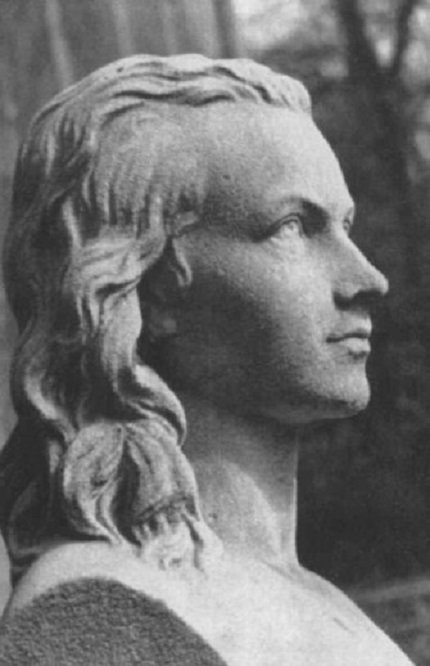A heir to an impoverished aristocratic family, raised in a family environment where the Pietistical spiritual attitude has been preserved, Novalis devotes himself to in-depth research and quickly establishes the authority of a capable mining engineer. As a poet, he first followed Shiller's example, but later he approached the Schlegel brothers and shared many of their theoretical statements about the poet's poetry and mission. The event, which brings a dramatic turn to his spiritual development, is the sudden death of his fiance, Sophie von Khu, who died in 1797 at the age of fifteen. In his lyrical cycle "The hymn of the Night" there was a radical change in the notion for the world. Shortened by the loss of the only beloved of the century.
Addition by Georg Lukac: The extremely sensitive soul of the girl, Novalis, presents life as death, and death as real life, the day as a night for the souls suffered, and the night as illuminated by the visions of the wounded by the loss of the Favorite Fancy Day. In 1798, Novalis' philosophical novel The Novices of Sais appeared, and one year later he published his lyrical book "Spiritual Songs". In the last years of his life he has been working on a kind of romantic "educational novel" Heinrich von Offtlingengen, which remains unfinished. In both parts - "Expectation" and "Performance", the romantic poet designs to follow the spiritual evolution of the legendary German miner, who lived and worked at the beginning of the 13th century. Georg Lukac say that this is the tragedy of Romanticism that only Novalis' life succeeded in becoming poetry. His victory is a condemnation of the death of the whole school. Because everything that romantics want to conquer their lives is enough to achieve a beautiful death. Their philosophy of life is only a philosophy of death, their art of living is the art of dying. Because their desire to embrace the whole world makes them slaves of all / fate and perhaps Novalis seems so great to us and so holistic, just because the slave of a lord is standing.
Novalis' aesthetic views: Novalis sets the beginning of romantic political theory with its short "Christianity and Europe". In it, he returns to Europe's happy era before Lutheranism, which breaks the spiritual unity of the Catholic religious community in the western borders of the continent. Novalis's most frequently cited aphorisms, which justify his peculiar "magical idealism," are: "We dream of traveling around the world, and the world is within ourselves. It is in us, and not elsewhere, that eternity, past, and future have settled, "and" There is once a puzzled riddle that takes us in. In 1798, in the journal of the Roman romantic "Athenaeum", Novalis's "Aesthetic Fragments" were released. They typically have a romantic view that culture rejects closed ideological systems. True freedom and infinity are inherent in true culture as a system. We have already said that Romantics prefer the aphoristic presentation of their theoretical insights and findings and highly appreciate the fragments as natural, spontaneous thought outbursts that give the most accurate idea of the nature of the newly emerging artistic trend - Romanticism.

